 OMAHA, Nebraska (Sept. 21, 2021)—The schedule of planned presentations for the 2021 MidWest Drug Development conference has been released.
OMAHA, Nebraska (Sept. 21, 2021)—The schedule of planned presentations for the 2021 MidWest Drug Development conference has been released.
Publishing the schedule helps registered participants plan partnering meetings that could propel Midwestern innovation into deeper stages of development. The partnering system will be the same software used at BIO and JPM. One-on-one partnering will be open Oct. 4-8.
Register here: https://www.mwdrugdevelopment.com/tickets/.
The technology presentations begin Monday, Oct. 4 and will run through Tuesday, Oct. 5. All told, about 43 technologies will be presented over both days.
Presentations will highlight therapeutics for cancer, infectious disease, autoimmune and inflammatory diseases, CNS diseases, and rare diseases.
View the entire schedule below or at https://www.mwdrugdevelopment.com/#schedule.
Due to the COVID-19 pandemic, the 2021 MidWest Drug Development Conference moved to a 100-percent virtual event.
Cost to attend the event is $500, but a discount code is available for select representatives at pharmaceutical companies and investment groups. To request a discount code, contact event organizers at https://www.mwdrugdevelopment.com/#contact.
Seventeen major Midwestern institutions are planning to present technologies during the virtual event, which will feature about 43 short presentations of their latest and most promising therapeutic innovations. Each participating institution will present some of their most promising therapeutic candidates in 10-minute presentations, followed by a brief Q&A session.
The 17 presenting institutions are Cincinnati Children’s Hospital, Colorado State University, Indiana University, Kansas State University, Mayo Clinic, Medical College of Wisconsin, Ohio State University, Purdue University, University of Colorado-Boulder, University of Iowa, University of Kansas, University of Kentucky, University of Minnesota, University of Missouri, University of Nebraska Medical Center, University of South Dakota and Wisconsin Alumni Research Foundation.
Additional guests will predominantly include key decision makers at pharmaceutical companies that are looking to expand their portfolio with new therapeutics. Also expected to attend are investment groups who are interested in building or investing in startups companies.
2021 MidWest Drug Development Conference Schedule
All times are CDT. Schedule is subject to change without notice.
October 4
9 a.m. — 10 a.m.
- Selective GRK5 Inhibitors (John Tesmer, Purdue University)
- DHODH Inhibitors for Hematological Malignancies (Chad Bennett and Jerry Hilinski, Ohio State)
- Dual Specific CAR T Cells for Cancer Therapy (Saad Kenderian, Mayo)
- Small Molecule PRMT5 Inhibitors for the Treatment of Pancreatic Cancer (Tao Lu, EQon Pharmaceuticals — Indiana University)
10 a.m. — 11 a.m.
- Novel mPGES-1 Inhibitors for Pain and Inflammatory Diseases (Chang-Guo Zhan, University of Kentucky)
- ProGel System for the Treatment of Pain and Inflammatory Diseases (Dong Wang, Ensign
- Pharmaceutical — University of Nebraska Medical Center)
- Strategically Substituted Agmatine Molecules for the Treatment of Pain (Carolyn Fairbanks, University of Minnesota)
11 a.m. — Noon
- Small Molecule Chaperones for the Restoration of acid-β-glucosidase Activity (Justin Levy, Cincinnati Children’s Hospital)
- New treatment for Status Epilepticus starves problematic neurons (John Nagel, WARF)
- Serine Protease Inhibitors for the Treatment of Eosinophilic Esophagitis (Reid Smith, Cincinnati Children’s Hospital)
1 p.m. — 2 p.m.
- Engineered Bacterial Strain for Eliminating Drug Resistance in GI tract (Landon Olp, Medical College of Wisconsin)
- Cell Therapy for the Treatment of Bacterial Infections (Ethan Mann, Validus Therapeutics — Colorado State University)
- Novel Antibiotics Targeting Beta-Lactamase (Brian Buntaine, University of Missouri)
- Antiviral Compounds Against SARS-CoV-2 infection (Jingxin Wang, University of Kansas)
2 p.m. — 3 p.m.
- Human Chimeric Antigen Receptor Neutrophils (Xiaoping Bao, Purdue University)
- Novel Selective HDAC6 Inhibitors for Cancer (Xuedong Liu, University of Colorado-Boulder)
- RNA-binding Protein Inhibitors for Metastatic Cancers (Liang Xu, University of Kansas)
- Compounds for the Prevention of Radiation and Radiotherapy-based Side Effects (Ding Xue, University of Colorado-Boulder)
3 p.m. — 5 p.m.
- BMP-2 RNA System for Bone Regeneration
(Sarah Sapouckey, University of Iowa) - Nanoparticles for the Delivery of Bioactive Molecules
(Rafael Diaz, WARF) - Microparticles for Targeted Drug Delivery to Teeth
(Abu Ahammadullah, University of South Dakota)
October 5
9 a.m. — 10 a.m.
- Novel Enzyme Therapeutics Targeting Childhood Dementia (Ron Bruntz, Avast, University of Kentucky)
- Small Molecule Wnt Modulators for Alzheimer’s Disease (Yonghe Li, Mayo Clinic)
- Cadherin Peptides for the Enhanced Delivery of Therapeutics to the Brain (Teruna Siahaan, University of Kansas)
10 a.m. — 11 a.m.
- Gene Therapy Approach for Metastatic Prostate Cancer (Marxa Figueiredo, Purdue University)
- SVC112 a Translation Elongation Inhibitor for the Treatment of Cancer Tin Tin Su, SuviCa — University of Colorado-Boulder)
- GRPr-PSMA Targeting Agents for Cancer (Brian Buntaine, University of Missouri)
- Mitochondrial Targeted Small Molecules for Oncology (Landon Olp, Medical College of Wisconsin)
11 a.m. — Noon
- Non-viral Formulation for Delivery of Lubricin Genes (Hozhabr Mozafari, University of Iowa)
- Dual Hybrid AAV Vector System for Gene Therapy (Brian Buntaine, University of Missouri)
1 p.m. — 2 p.m.
- DGMS-RAR7 for the Treatment of Pulmonary Arterial Hypertension (TBA, Drax Therapeutics — Indiana University)
- Humanized Antibodies for the Treatment of Type 1 Diabetes (Jan Czyzyk, University of Minnesota)
- Modulator of Dimethylarginine Dimethylaminohydrolase for the Treatment of Kidney Disease (Jon Northrup, Vasculonics — Indiana University)
2 p.m. — 3 p.m.
- Paclitaxel Prodrugs (John Nagel, WARF)
- MUC16 Antibody for the Treatment of Cancer (TBA, University of Nebraska Medical Center)
- TTK Kinase Inhibitors for Hematological Malignancies (Jerry Hilinski and Celeste Alverez, Ohio State University)
- Cancer Vaccine Strategy (John Weston, PhotonPharma — Colorado State)
3 p.m. — 4 p.m.
- Therapeutic Cancer Vaccine Platform (Damian Gerald and Reena Shakya, Ohio State University)
- Vaccine against Enterotoxigenic Escherichia coli (Aarushi Gupta, Kansas State University)
- Perforin Inhibitor for the Enhancement of Vaccine-elicited Responses (Stephen Waggoner, Cincinnati Children’s Hospital)
